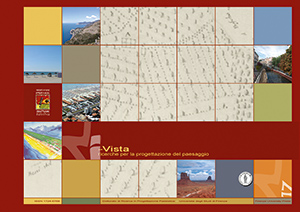Research Scientific JournalsRi-Vista
Ri-Vista
|
Founded in 2003 by Giulio G. Rizzo, coordinator at the time of the PhD programme in Landscape Design. It is thus an experience born in a research-oriented university context. From 2009 to 2014 it was edited by Gabriele Corsani, who had also taken over from Rizzo as coordinator of the PhD, and who maintained the characteristic presence of research doctors in the editing committee, as well as the initial profile of the review as a study group. From 2014, Ri-Vista is a part of the scientific periodicals of the University related to the Department of Architecture, and is edited by Gabriele Paolinelli, who heads the Landscape Architecture section of the new PhD in Architecture. This has coincided with a new series that the editorial board had been preparing for over a year. The first series, 2003-2013, is entirely available for consultation or download. The second series, which begins with number 0/2014, marks a new direction yet maintains some continuity with the previous production, as well as its original nature as a biannual free-access digital review. The new graphic design, sober and elegant, facilitates consultation online, and presents a good overall quality in terms of image and communication.
|
|
|
Ri-Vista series 2
vol. 00 - July-December 2014
The progressive and rapid evolution of digital technologies has increasingly influenced the scientific areas involved in the complex field of architecture. In this context, the development and diffusion of geographical information systems constitutes a significant phenomenon. This issue of Ri-Vista deals with the relationships between geographical information and landscape, which are as varied and complex as the developments themselves. From the point of view of the applications of digital information technologies to the analysis and diagnostics of landscapes, as well as of landscape planning and design, there is a growing interest regarding the issue of the representation of landscapes, which is usually not a concern of the said instruments. The continuous combination of analog, numerical, manual and digital skills and potentialities, will probably allow increasingly interesting connections between geographical information and landscape representation. These are also fertile scenarios concerning communication and diffusion, which are essential for activating fruitful dialogues between the scientific and technical visions and the social perceptions of landscapes.
|
| ISSN: 1724-6768 |
 |
|

Ri-Vista 2003-2007
|

Ri-Vista 2008-2013
|
|
|
|
|
|
|
| |
|
|
|